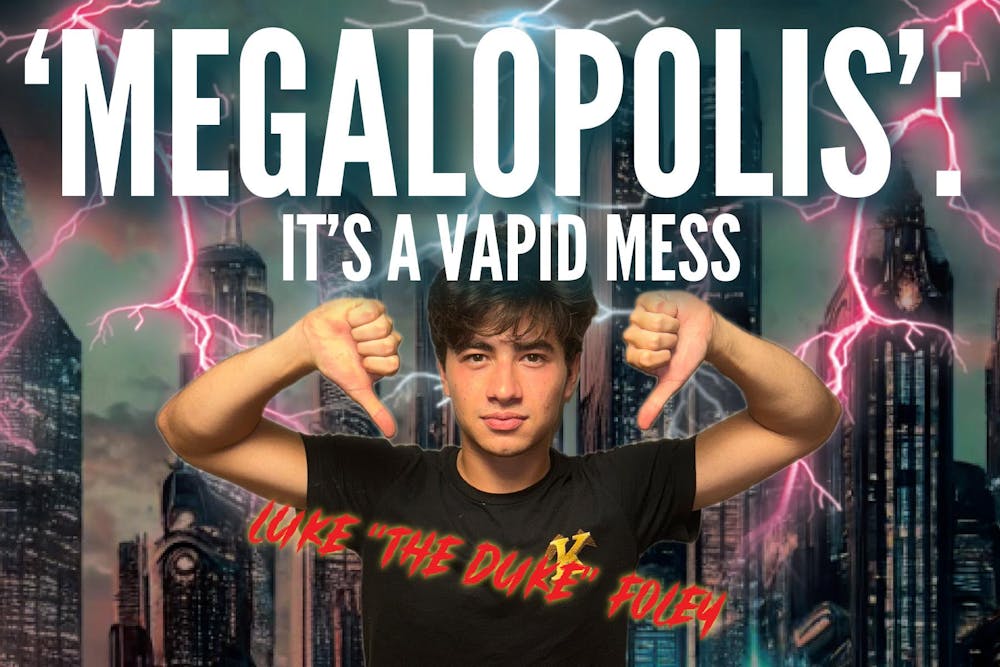After decades of production hell, thousands of Coppola wine bottles sold, $150 million which will never see a return on investment, blacklisting from Hollywood studios, sexual misconduct allegations and a trailer with fake AI quotes, Francis Ford Coppola’s “Megalopolis” has arrived in theaters to the utter bewilderment of audiences. However, factions are already forming within the film community. On one side, you have the vehement auteurists who believe “Megalopolis” is a stunning, uncompromising late-style masterpiece from a singular visionary. Others deem it as incoherent rubbish from an octogenarian who has gone insane. While I love auteurism and take pride in championing polarizing work, I fear that I fall in the latter camp. “Megalopolis,” while commendable for its audacity, is often a tedious mess that collapses under the weight of its imagination and ideas.
The film’s bizarre story stems from Coppola’s fascination with Rome’s past and America’s future. As such, the film takes place in “New Rome,” a New York City that is part of a hypothetical continuation of Ancient Rome, the “American Republic.” It’s an intriguing slice of alternative history, and the film’s gaudy costuming and set design fully capitalize on the idea. However, Coppola’s narrative in this setting is full of squandered potential and nonsensical detours. It centers on Cesar Catalina (Adam Driver) — a brilliant, strange architect who aspires to build a utopia, Megalopolis, within New Rome using a newly invented substance, Megalon. Catalina is rivals with Mayor Cicero (Giancarlo Esposito), who admonishes his progressive ideals and advocates for more conservative governance. Cesar is also a member of the uber-wealthy Catalina banking family led by patriarch Hamilton Crassus (Jon Voight) and his grandkids, including nemesis Clodio Pulcher (Shia LaBeouf).
One would think the man who made “The Godfather” would be able to once again tell an engrossing tale of political intrigue and familial drama, yet “Megalopolis” is somehow both overly complicated and simple. The characters of Megalopolis are goofy and absurd, which can be amusing, but it leaves the film with minimal dramatic stakes. And their motivations, which are often feelings as basic as jealousy and greed, change on a whim after one pompous conversation. There are also so many digressions and bits of exposition that introduce information that adds nothing and leaves you even more confused about the characters and their past.
The political commentary of “Megalopolis” has its focus in the right place, but it’s woefully imprecise. Coppola advocates for progressive ideals uncompromised by the status quo and reactionary sentiments, and condemns billionaire rabble-rousers who use populism to placate the masses and convince them to betray themselves. These are strong ideas, but their execution is annoyingly lackluster and daft. Cesar delivers breathless screeds full of archaic syntax that fail to stir, and characters inexplicably don confederate flags and Nazi black suns because Coppola can’t think of a more subtle way to portray fascism. The film’s defenders will say these traits are features, not bugs, but I find such crude political messaging to be bad and a disappointing copout from the very rich potential of the world Coppola has crafted.
While most of the performances are shockingly good and attuned to the film’s idiosyncratic wavelength, one central performance really brought the film down: Nathalie Emmanuel as Julia Cicero, Cesar’s love interest and Mayor Cicero’s daughter. I can tell Emmanuel was trying to deliver a campy performance that aligned with the crazy script she was given, and while this approach worked for her castmates, I think she utterly failed. Her performance was grating and obnoxious, and only exacerbated the film’s bombastic lines and vapidness. Emmanuel made some scenes unbearable and distracted from the incredible work her frequent screen partner Adam Driver was doing.
I could go on and on about “Megalopolis,” but I’ll leave it there. The film is a bold, earnest and imposing work that exists outside all conventions and industry standards. However, that doesn’t necessarily mean it’s a good movie. It frequently becomes high on its own grandiosity and fails to deliver on its premise and lofty themes of art, love and society. I wish I could see it as the masterpiece its fans think it is, but sadly just view it as brave nonsense.










